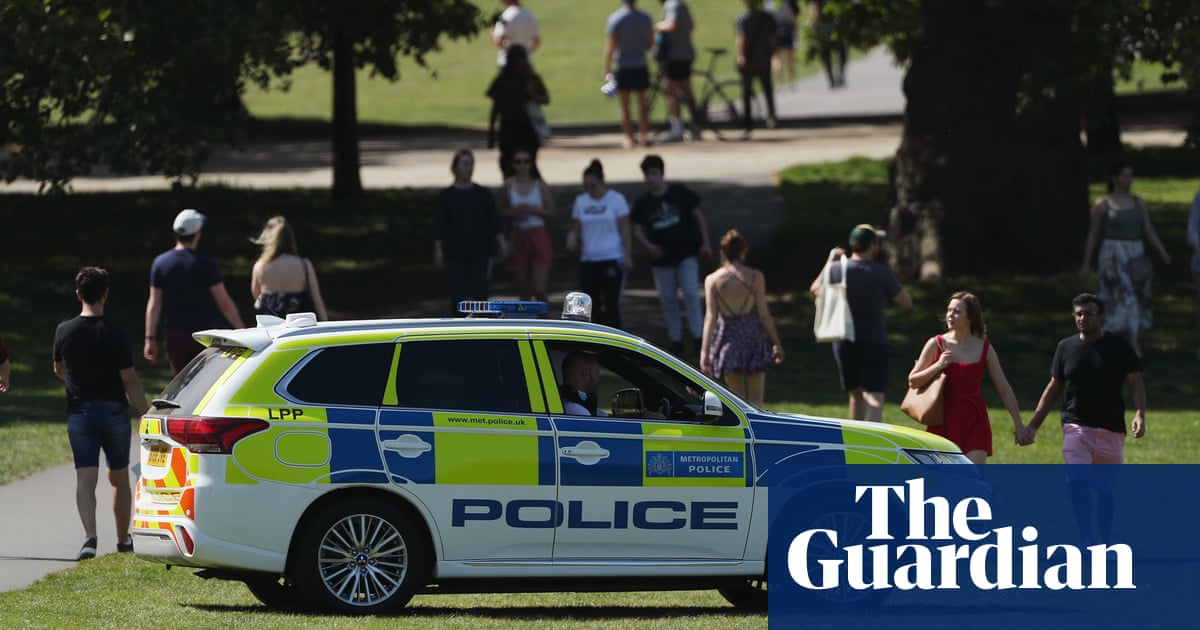
Police enforcing the coronavirus lockdown in England and Wales were almost up to seven times more likely to issue fines to black, Asian and minority ethnic people than white people, figures show.
Data from police forces shows 17 were more likely to issue a penalty notice to BAME people than to white people. Two forces, Northumbria and Merseyside, were not.
One senior chief constable said bias and lack of trust from certain communities may have played a role, as well as demographics.
Officers had discretion on when to issue fines, and police said they followed an approach of trying to avoid enforcement, known as the four Es – engaging, explaining and encouraging, before considering enforcement.
Figures obtained by Liberty Investigates, part of the civil liberties group Liberty, and the Guardian, give a force-by-force breakdown. The figures are yet to be officially released and had been requested by the home affairs committee investigation into race and policing, which met on Wednesday.
The mainly rural Cumbria force was 6.8 times more likely to fine someone who was a BAME background than a white person. In Lincolnshire, and Avon and Somerset, which includes Bristol, people from a BAME background were 4.4 times more likely to be fined by police.
Q&A
What are the UK government’s ‘five tests’ for ending lockdown restrictions?
Show
Hide
In April the UK government set out these five tests it said had to be met before they would consider easing coronavirus lockdown restrictions:
- The NHS has sufficient capacity to provide critical care and specialist treatment right across the UK
- A sustained and consistent fall in daily deaths from Coronavirus
- Reliable data to show that the rate of infection is decreasing to manageable levels across the board
- Operational challenges including testing and personal protective equipment (PPE) are in hand with supply able to meet future demand
- Confident that any adjustments to the current measures will not risk a second peak of infections that overwhelms the NHS
As a proportion of total population, the figures showed most forces were two to three times more likely to believe the behaviour of a BAME person merited a fine compared with a white person they came across.
Jon Sherlock, a chief inspector with the Cumbria Constabulary, said most fixed penalty notices were issued to BAME people who were visiting Cumbria: “Of the Cumbrian residents issued penalty notices, five were of a BAME background. In relation to those who reside outside of Cumbria, 22 people of a BAME background were issued a fixed penalty notice.
“Overall just over 8% of fixed penalty notices issued were to individuals of a BAME background.”
Each of the 43 forces in England and Wales is operationally independent and decided how they would police the lockdown. People were ordered to stay home unless they had an essential reason to leave.
Historically, police use of powers had been the subject of past complaints that those from a BAME background were overly targeted.
The laws and rules for the lockdown were rushed in, and came into force on 27 March.
West Midlands police, the second largest force in England and Wales, was 1.6 more times likely to issue a fine to someone from a BAME background, compared with someone white.
Dave Thompson, the chief constable of the West Midlands, told the Guardian: “I can’t rule out as a service we do have biases and discrimination. Our interactions based on the four Esmay be less successful if trust is already low with certain communities.”
He said his force had issued a very low level of fines and that demographics may also have contributed to the disproportionality. Furthermore, fines were more likely to be handed out to younger people and the BAME population made up a greater proportion of young people in his area.
Sgt Tola Munro, the president of the National Black Police Association, called for an inquiry by the police inspectorate. He said: “It’s concerning. Looking at the figures there is disproportionality. Her Majesty’s Inspectorate of Constabulary is the best body to look into these figures.”
The former Metropolitan police chief Brian Paddick said: “In the light of Black Lives Matter, this demands an answer from the police service as to why this is happening.”
The burden has to be on the police to justify this disproportionality, he added. “It clearly raises the question of bias in the way the law and powers are being applied.”
Suffolk police, where BAME people were four times more likely to be fined, said: “Further analytical work is being conducted in relation to the figures. However, we can say that the tickets issued to individuals from a black and minority ethnic background are broadly in line with the diversity of those communities where the offences occurred, with the majority of fixed penalty notices issued done so in the central Ipswich area.”
One force, Merseyside, first supplied data showing it to be disproportionate, then when asked why, supplied data suggesting it was not.
A spokesperson for the National Police Chiefs’ Council said: “We have commissioned detailed statistical analysis of the force-level ethnicity data. It is a complex dataset requiring further work to ensure accuracy and that conclusions can meaningfully and confidently be drawn from it. We will present the findings of the analysis once it is completed.”
The Guardian





